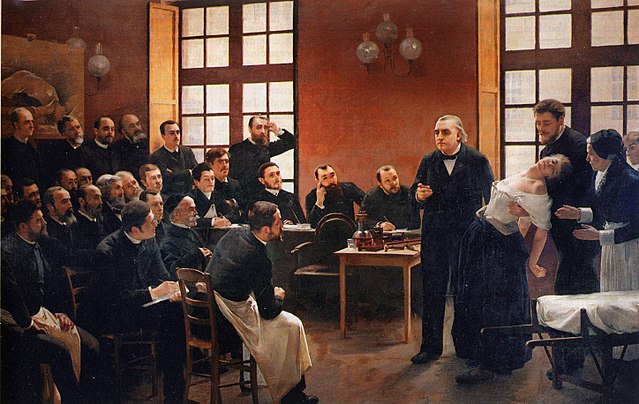Line 17:
and task-motivated subjects. American Journal of Clinical Hypnosis, 18, 252-262.</ref> while its use as a form of entertainment for an audience is known as "[[stage hypnosis]]", a form of [[mentalism]].
Hypnosis-based therapies for the management of [[irritable bowel syndrome]] and [[menopause]] are supported by evidence.<ref>{{Cite journal|last1=Peters|first1=S. L.|last2=Yao|first2=C. K.|last3=Philpott|first3=H.|last4=Yelland|first4=G. W.|last5=Muir|first5=J. G.|last6=Gibson|first6=P. R.|date=2016|title=Randomised clinical trial: the efficacy of gut-directed hypnotherapy is similar to that of the low FODMAP diet for the treatment of irritable bowel syndrome|journal=Alimentary Pharmacology & Therapeutics|language=en|volume=44|issue=5|pages=447–459|doi=10.1111/apt.13706|pmid=27397586|s2cid=42525698|issn=1365-2036|doi-access=free}}</ref><ref>{{Cite journal|last1=Lacy|first1=Brian E.|last2=Pimentel|first2=Mark|last3=Brenner|first3=Darren M.|last4=Chey|first4=William D.|last5=Keefer|first5=Laurie A.|last6=Long|first6=Millie D.|last7=Moshiree|first7=Baha|date=January 2021|title=ACG Clinical Guideline: Management of Irritable Bowel Syndrome|journal= American Journal of Gastroenterology|language=en-US|volume=116|issue=1|pages=17–44|doi=10.14309/ajg.0000000000001036|pmid=33315591|issn=0002-9270|doi-access=free}}</ref><ref name="ncbi.nlm.nih.gov">{{Cite journal|last1=Elkins|first1=Gary R.|last2=Fisher|first2=William I.|last3=Johnson|first3=Aimee K.|last4=Carpenter|first4=Janet S.|last5=Keith|first5=Timothy Z.|date=March 2013|title=Clinical Hypnosis in the Treatment of Post-Menopausal Hot Flashes: A Randomized Controlled Trial|journal=Menopause|volume=20|issue=3|pages=291–298|doi=10.1097/GME.0b013e31826ce3ed|issn=1072-3714|pmc=3556367|pmid=23435026}}</ref><ref name="auto">{{Cite journal|date=November 2015|title=Nonhormonal management of menopause-associated vasomotor symptoms: 2015 position statement of The North American Menopause Society|url=https://pubmed.ncbi.nlm.nih.gov/26382310/|journal=Menopause|volume=22|issue=11|pages=1155–1172; quiz 1173–1174|doi=10.1097/GME.0000000000000546|issn=1530-0374|pmid=26382310|s2cid=14841660|access-date=7 September 2021|archive-date=22 March 2021|archive-url=https://web.archive.org/web/20210322145613/https://pubmed.ncbi.nlm.nih.gov/26382310/|url-status=live}}</ref> Use of hypnosis for treatment of other problems has produced mixed results, such as with [[smoking cessation]].<ref>{{Cite journal|title=Hypnotherapy is more effective than nicotine replacement therapy for smoking cessation: Results of a randomized controlled trial|year=2014|doi=10.1016/j.ctim.2013.12.012|language=en|url=https://www.sciencedirect.com/science/article/abs/pii/S0965229913002100|last1=Hasan|first1=Faysal M.|last2=Zagarins|first2=Sofija E.|last3=Pischke|first3=Karen M.|last4=Saiyed|first4=Shamila|last5=Bettencourt|first5=Ann Marie|last6=Beal|first6=Laura|last7=Macys|first7=Diane|last8=Aurora|first8=Sanjay|last9=McCleary|first9=Nancy|journal=Complementary Therapies in Medicine|volume=22|issue=1|pages=1–8|pmid=24559809|access-date=2 March 2021|archive-date=22 December 2021|archive-url=https://web.archive.org/web/20211222162421/https://www.sciencedirect.com/science/article/abs/pii/S0965229913002100|url-status=live}}</ref><ref>{{Cite journal|title=Hypnosis for smoking cessation: a randomized trial|year=2008|pmid=18569754|language=en|url=https://pubmed.ncbi.nlm.nih.gov/18569754/|last1=Carmody|first1=T. P.|last2=Duncan|first2=C.|last3=Simon|first3=J. A.|last4=Solkowitz|first4=S.|last5=Huggins|first5=J.|last6=Lee|first6=S.|last7=Delucchi|first7=K.|journal=Nicotine & Tobacco Research|volume=10|issue=5|pages=811–818|doi=10.1080/14622200802023833|s2cid=36395279|access-date=2 March 2021|archive-date=3 March 2022|archive-url=https://web.archive.org/web/20220303055959/https://pubmed.ncbi.nlm.nih.gov/18569754/|url-status=live}}</ref><ref>{{Cite journal|last1=Barnes|first1=Joanne|last2=McRobbie|first2=Hayden|last3=Dong|first3=Christine Y|last4=Walker|first4=Natalie|last5=Hartmann-Boyce|first5=Jamie|date=2019-06-14|editor-last=Cochrane Tobacco Addiction Group|title=Hypnotherapy for smoking cessation|journal=Cochrane Database of Systematic Reviews|volume=2019|issue=6|pages=CD001008|language=en|doi=10.1002/14651858.CD001008.pub3|pmc=6568235|pmid=31198991}}</ref>
Like placebos, clinical hypnosis induces physiological effects by altering client’s expectations, but it is honestly presented as a psychological procedure and therefore does not require deception in order to be effective. <ref>{{cite book |last=Kirsch |first=Irving |date=1999 |chapter=Clinical hypnosis as a nondeceptive placebo |editor1-last=Kirsch |editor1-first=Irving |editor2-last=Capafons |editor2-first=Antonio |editor3-last=Cardeña-Buelna |editor3-first=Etzel |editor4-last=Amigó |editor4-first=Salvador |title=Clinical hypnosis and self-regulation: Cognitive-behavioral perspectives |pages=211–225 |publisher=American Psychological Association |isbn=1557985359 |doi=10.1037/10282-008}}</ref>
The use of hypnosis as a form of therapy to retrieve and integrate early trauma is controversial within the scientific mainstream. Research indicates that hypnotising an individual may aid the formation of false memories,<ref>{{cite book |last1=Lynn |first1=Steven Jay |last2=Krackow |first2=Elisa |last3=Loftus |first3=Elizabeth F. |author-link3=Elizabeth Loftus |last4=Locke |first4=Timothy G. |last5=Lilienfeld |first5=Scott O. |author-link5=Scott Lilienfeld |date=2014 |chapter=Constructing the past: problematic memory recovery techniques in psychotherapy |editor1-last=Lilienfeld |editor1-first=Scott O. |editor2-last=Lynn |editor2-first=Steven Jay |editor3-last=Lohr |editor3-first=Jeffrey M. |title=Science and pseudoscience in clinical psychology |edition=2nd |location=New York |publisher=[[Guilford Press]] |pages=245–275 |isbn=9781462517510 |oclc=890851087}}</ref><ref>{{Cite book |last=French |first=Christopher C. |url=https://www.academia.edu/101922617 |title=The Reliability of UFO Witness Testimony |publisher=UPIAR |year=2023 |isbn=9791281441002 |editor-last=Ballester-Olmos |editor-first=V.J. |location=Turin, Italy |pages=283–294 |chapter=Hypnotic Regression and False Memories |editor-last2=Heiden |editor-first2=Richard W.}}</ref> and that hypnosis "does not help people recall events more accurately".<ref>{{cite news |last1=Hall |first1=Celia |title=Hypnosis does not help accurate memory recall, says study |url=https://www.telegraph.co.uk/news/worldnews/1338671/Hypnosis-does-not-help-accurate-memory-recall-says-study.html |archive-url=https://ghostarchive.org/archive/20220111/https://www.telegraph.co.uk/news/worldnews/1338671/Hypnosis-does-not-help-accurate-memory-recall-says-study.html |archive-date=11 January 2022 |url-access=subscription |url-status=live |website=Telegraph |access-date=11 March 2019|date=26 August 2001}}{{cbignore}}</ref> Medical hypnosis is often considered [[pseudoscience]] or [[quackery]].<ref name="Naudet Falissard Boussageon Healy 2015 pp. 631–634">{{cite journal | last1=Naudet | first1=Florian | last2=Falissard | first2=Bruno |author2-link= Bruno Falissard | last3=Boussageon | first3=Rémy | last4=Healy | first4=David | title=Has evidence-based medicine left quackery behind? | journal=Internal and Emergency Medicine | volume=10 | issue=5 | date=2015 | issn=1970-9366 | pmid=25828467 | doi=10.1007/s11739-015-1227-3 | pages=631–634 | s2cid=20697592 | url=https://hal-univ-rennes1.archives-ouvertes.fr/hal-01138648/file/Has%20evidence-based%20medicine%20left%20quackery%20behind_accepted.pdf | quote=Treatments such as relaxation techniques, chiropractic, therapeutic massage, special diets, megavitamins, acupuncture, naturopathy, homeopathy, hypnosis and psychoanalysis are often considered as ‘‘pseudoscience’’ or ‘‘quackery’’ with no credible or respectable place in medicine, because in evaluation they have not been shown to ‘‘work’’}}</ref><!-- fails verification: <ref name="Bewley Ross Braillon Ernst 2011 p. d5960">{{cite journal | last1=Bewley | first1=Susan | last2=Ross | first2=Nick | last3=Braillon | first3=Alain | last4=Ernst | first4=Edzard | last5=Garrow | first5=John | last6=Rose | first6=Les | last7=Brahams | first7=Diana | last8=Baum | first8=Michael | last9=Marks | first9=Vincent | last10=Isaacs | first10=Keith | last11=May | first11=James | title=Clothing naked quackery and legitimising pseudoscience | journal=BMJ (Clinical Research Ed.) | volume=343 | date=2011-09-20 | issn=1756-1833 | pmid=21937550 | doi=10.1136/bmj.d5960 | page=d5960| s2cid=19450377 }}</ref><ref name="Ernst 2011 p. d4370">{{cite journal | last=Ernst | first=Edzard | title=College of medicine or college of quackery? | journal=BMJ (Clinical Research Ed.) | volume=343 | date=2011-07-12 | issn=1756-1833 | pmid=21750062 | doi=10.1136/bmj.d4370 | page=d4370| s2cid=8061172 }}</ref>-->
{{TOC limit|3}}
== Etymology ==
|
 Article Images
Article Images